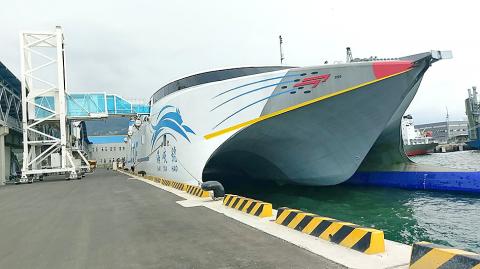The number of travelers between the Port of Taipei and Pingtan in China’s Fujian Province is expected to increase by about 19 percent to reach 110,000 this year, Taiwan International Ports Corp’s Keelung branch said yesterday.
Increases in demand and supply of passenger transport services, as well as ticket discounts, have contributed to a gradual rise in passengers on the cross-strait sea route, Port of Keelung chief secretary Chang Yi-yuan (張溢源) said.
The number of travelers between the Port of Taipei and Pingtan grew from 71,410 in 2016 and 77,390 in 2017 to 92,000 last year, Chang said, adding that travelers on the route are expected to top 110,000 this year.

Photo: CNA
In view of the increase in passengers, two shipping firms operating the Port of Taipei-Pingtan route — Fujian Cross Strait Ferry Corp and Uni-Wagon Maritime Co — last month began increasing the number of services from four round-trip voyages per week to six round-trip services per week, which has expanded capacity by 12,000 passengers per month, he said.
As of Monday, 45,000 passengers had used the cross-strait ferry service this year, a 26 percent increase from the same period last year, he added.
The shipping firms have been offering discounts to passengers, with a round-trip ticket between the Port of Taipei and Pingtan costing NT$3,000 per person for group travelers or NT$3,500 for individual passengers — only slightly more than a round-trip high-speed rail ticket between Taipei and Zuoying (左營) in Kaohsiung, Chang said.
Most Chinese travelers using the service were tourists, while Taiwanese passengers were mostly business travelers, he said.
The travel time from the Port of Taipei to Pingtan is about three-and-a-half hours, Chang said, adding that Taiwanese are required to present their passport and Mainland Travel Permit to purchase tickets.
The Port of Taipei is close to New Taipei City’s Bali (八里) and Tamsui (淡水) districts, as well as an outlet mall in Linkou District (林口), he said, adding that expressways No. 61 and No. 64 connect the port with Taipei and New Taipei City, as well as Taiwan Taoyuan International Airport, which is 25 minutes away.

Taiwanese were praised for their composure after a video filmed by Taiwanese tourists capturing the moment a magnitude 7.5 earthquake struck Japan’s Aomori Prefecture went viral on social media. The video shows a hotel room shaking violently amid Monday’s quake, with objects falling to the ground. Two Taiwanese began filming with their mobile phones, while two others held the sides of a TV to prevent it from falling. When the shaking stopped, the pair calmly took down the TV and laid it flat on a tatami mat, the video shows. The video also captured the group talking about the safety of their companions bathing

US climber Alex Honnold is to attempt to scale Taipei 101 without a rope and harness in a live Netflix special on Jan. 24, the streaming platform announced on Wednesday. Accounting for the time difference, the two-hour broadcast of Honnold’s climb, called Skyscraper Live, is to air on Jan. 23 in the US, Netflix said in a statement. Honnold, 40, was the first person ever to free solo climb the 900m El Capitan rock formation in Yosemite National Park — a feat that was recorded and later made into the 2018 documentary film Free Solo. Netflix previewed Skyscraper Live in October, after videos

Starting on Jan. 1, YouBike riders must have insurance to use the service, and a six-month trial of NT$5 coupons under certain conditions would be implemented to balance bike shortages, a joint statement from transportation departments across Taipei, New Taipei City and Taoyuan announced yesterday. The rental bike system operator said that coupons would be offered to riders to rent bikes from full stations, for riders who take out an electric-assisted bike from a full station, and for riders who return a bike to an empty station. All riders with YouBike accounts are automatically eligible for the program, and each membership account

A classified Pentagon-produced, multiyear assessment — the Overmatch brief — highlighted unreported Chinese capabilities to destroy US military assets and identified US supply chain choke points, painting a disturbing picture of waning US military might, a New York Times editorial published on Monday said. US Secretary of Defense Pete Hegseth’s comments in November last year that “we lose every time” in Pentagon-conducted war games pitting the US against China further highlighted the uncertainty about the US’ capability to intervene in the event of a Chinese invasion of Taiwan. “It shows the Pentagon’s overreliance on expensive, vulnerable weapons as adversaries field cheap, technologically